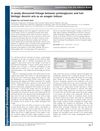 11 citations,
September 2014 in “International Journal of Molecular Sciences”
11 citations,
September 2014 in “International Journal of Molecular Sciences” Mycophenolate helps reverse hair loss effects caused by IFN-γ by activating a key hair growth pathway.
 10 citations,
August 2014 in “Experimental Dermatology”
10 citations,
August 2014 in “Experimental Dermatology” Decorin, a protein, may help start hair growth and could be used to treat hair loss.
 64 citations,
March 2005 in “Journal of Investigative Dermatology”
64 citations,
March 2005 in “Journal of Investigative Dermatology” Brain-Derived Neurotrophic Factor (BDNF) slows down hair growth and promotes hair follicle regression.
 6 citations,
January 2010 in “Springer eBooks”
6 citations,
January 2010 in “Springer eBooks” SA linked to mitochondrial issues and oxidative stress, while AGA involves disrupted hair growth genes.

Ashwagandha-derived nanoparticles can promote human hair growth.
 April 2023 in “Journal of Investigative Dermatology”
April 2023 in “Journal of Investigative Dermatology” Ashwagandha nanoparticles help increase hair growth.
 47 citations,
August 2016 in “Fitoterapia”
47 citations,
August 2016 in “Fitoterapia” Some herbs and their components might help treat hair loss by affecting various biological pathways, but more research and regulation are needed.
 92 citations,
June 2005 in “Journal of Investigative Dermatology”
92 citations,
June 2005 in “Journal of Investigative Dermatology” All-trans retinoic acid causes hair loss by increasing TGF-β2 in hair follicle cells.
 15 citations,
August 2017 in “International Journal of Molecular Medicine”
15 citations,
August 2017 in “International Journal of Molecular Medicine” Panax ginseng extract may help prevent hair loss caused by DKK-1.
 124 citations,
August 1994 in “Journal of Investigative Dermatology”
124 citations,
August 1994 in “Journal of Investigative Dermatology” Dexamethasone speeds up hair loss in mice, while cyclosporin A slows it down.
 15 citations,
September 2008 in “Archives of Dermatological Research”
15 citations,
September 2008 in “Archives of Dermatological Research” Roxithromycin, an antibiotic, can increase hair growth and might be used as a treatment for hair loss.
 3 citations,
November 2019 in “Journal of Investigative Dermatology”
3 citations,
November 2019 in “Journal of Investigative Dermatology” Adenosine helps human hair grow and prevents hair loss by targeting specific cells.
132 citations,
September 2009 in “Experimental Dermatology” A reliable system was developed to distinguish hair growth stages, aiding in identifying hair growth promoters or inhibitors.
 42 citations,
July 2012 in “PLOS ONE”
42 citations,
July 2012 in “PLOS ONE” Estrogen can temporarily slow down hair growth but this can be reversed.
 159 citations,
December 2007 in “American Journal of Pathology”
159 citations,
December 2007 in “American Journal of Pathology” Stress-related substance P may lead to hair loss and negatively affect hair growth.
 122 citations,
November 2010 in “Journal of Dermatological Science”
122 citations,
November 2010 in “Journal of Dermatological Science” Male pattern baldness involves hormones and cell signals affecting hair growth.
 53 citations,
January 2009 in “Journal of Investigative Dermatology”
53 citations,
January 2009 in “Journal of Investigative Dermatology” UVB radiation harms hair growth and health, causing cell death and other changes in human hair follicles.
 26 citations,
October 2007 in “Experimental Dermatology”
26 citations,
October 2007 in “Experimental Dermatology” L-Carnitine-L-tartrate may help hair grow and prevent hair loss.
 4 citations,
July 2020 in “Biochemical and Biophysical Research Communications”
4 citations,
July 2020 in “Biochemical and Biophysical Research Communications” A protein called ectodysplasin-A2 increases a hair growth inhibitor in balding cells, which could be a target for hair loss treatment.
 July 2019 in “Journal of Investigative Dermatology”
July 2019 in “Journal of Investigative Dermatology” The research found that male pattern hair loss is mostly genetic and involves hair thinning due to hormonal effects and changes in gene expression.
134 citations,
July 2020 in “Experimental dermatology” Hair follicles are normally protected from the immune system, but when this protection fails, it can cause hair loss in alopecia areata.
 39 citations,
March 2009 in “Archives of Dermatological Research”
39 citations,
March 2009 in “Archives of Dermatological Research” Apigenin may help promote hair growth and could treat hair loss.
 52 citations,
September 2018 in “International Journal of Molecular Sciences”
52 citations,
September 2018 in “International Journal of Molecular Sciences” Ginseng and its compounds may help hair growth and prevent hair loss, but more human trials are needed to confirm this.
 39 citations,
March 2018 in “Archives of Dermatological Research”
39 citations,
March 2018 in “Archives of Dermatological Research” Androgens may block hair growth signals, targeting this could treat hair loss.
 1 citations,
August 2020 in “British Journal of Dermatology”
1 citations,
August 2020 in “British Journal of Dermatology” Caffeine may protect hair follicles from stress-related hair loss.
 October 2023 in “Scientific reports”
October 2023 in “Scientific reports” Dexamethasone affects hair growth by altering levels of proteins that either promote or inhibit hair follicle growth.
 174 citations,
April 2005 in “The American journal of pathology (Print)”
174 citations,
April 2005 in “The American journal of pathology (Print)” Capsaicin, found in chili peppers, can slow down hair growth by affecting skin cells and hair follicles.
 76 citations,
August 2018 in “International Journal of Cosmetic Science”
76 citations,
August 2018 in “International Journal of Cosmetic Science” Dermal Papilla cells are a promising tool for evaluating hair growth treatments.
 53 citations,
March 2014 in “Growth Hormone & IGF Research”
53 citations,
March 2014 in “Growth Hormone & IGF Research” IGF-1 injections help mice grow more hair by increasing cell growth and blocking a hair growth inhibitor.
 24 citations,
January 2020 in “International Journal of Molecular Sciences”
24 citations,
January 2020 in “International Journal of Molecular Sciences” Some plants with flavonoids may help treat hair loss and promote hair growth.




























